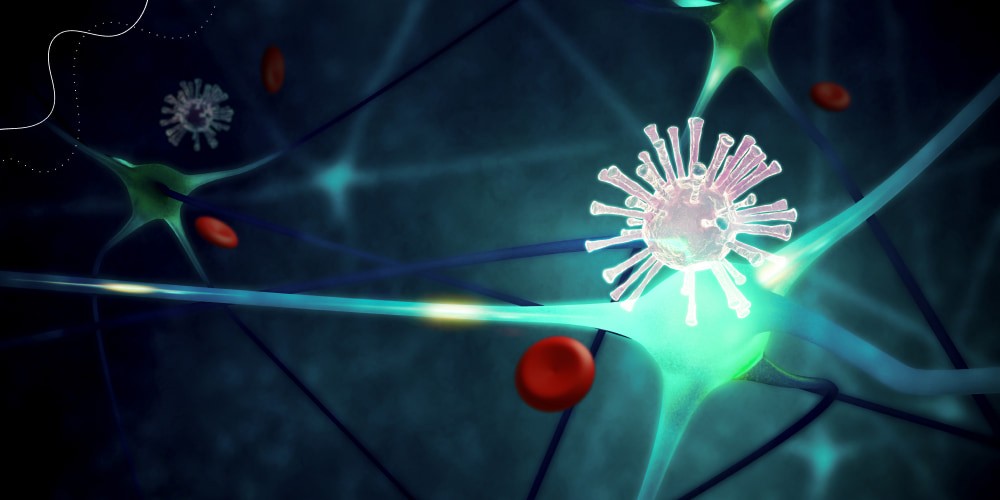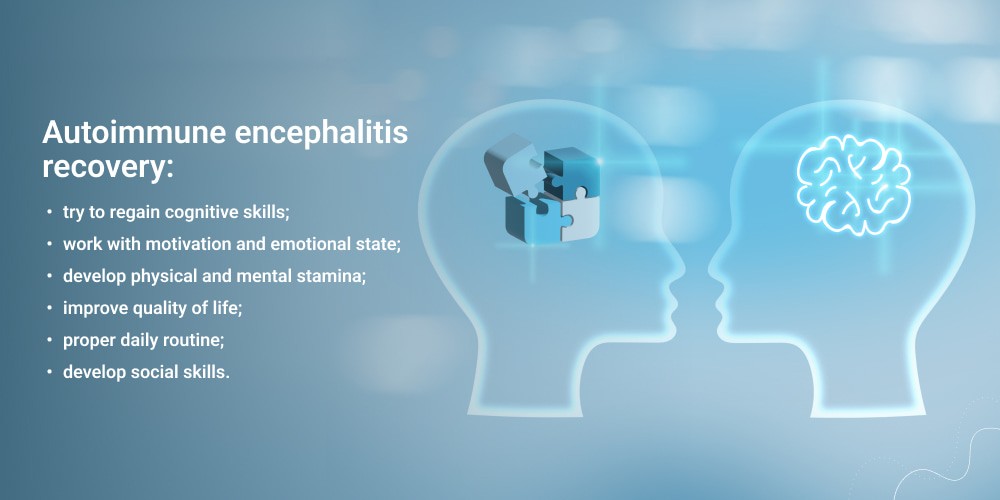After treatment for encephalitis, you should be prepared because recovering can be long and difficult. Encephalitis affects the brain, so neurons (nerve cells in the brain) are affected. People with encephalitis experience effects similar to those of strokes, head injuries, and other brain diseases. These are usually associated with cognitive and speech impairment.
All these encephalitis long-term prognosis impacts should not be underestimated on a person’s life and social relationships. It is, therefore, important to be sensitive to a loved one who has had encephalitis. Returning to everyday life, work, or study after encephalitis can be difficult for many. In children, the effects may not appear immediately. Still, as the child matures and develops, it is significant to follow up with the doctor and be aware of any changes in the child’s behavior. You should pay particular attention to any cognitive impairment and rapid fatigue.
How Long Does Encephalitis Recovery Take?
Encephalitis can cause short-term after effects and those that will accompany you for the rest of your life. On average, in the mild form, the body recovers in 1-2 months, in the moderate form in 3-4 months, and in the severe condition in several years. People who have survived the dangerous disease receive special treatment. As a result, the effects of encephalitis become less pronounced or disappear altogether.
As with treatment, autoimmune encephalitis recovery depends mainly on the specific clinical case, the form of encephalitis, and the after-effects of the disease. However, the autoimmune encephalitis life expectancy after encephalitis, in general, ranges from 60 to 90 years in different countries. It is not only important to create an environment that is conducive to the patient’s natural recovery. Some areas of recovery need to be corrected and stimulated so that the person can return to their previous life as quickly and comfortably as possible.
What Are the Key Factors for Quality Recovering From Encephalitis?
Creating an environment for a natural recovery process is vital for any type of encephalitis. In most cases, people with relatively light diseases recover for several weeks without any complications in the long term. In addition to a supportive environment and surroundings, the person needs help from rehabilitation specialists as the illness affects the cognitive, behavioral, social, emotional, and medical aspects.
The recovery process after encephalitis typically involves a neurologist, psychologist, speech therapist, occupational therapist, and other therapists. Their joint efforts aim to restore body functions or compensate for them with possible methods. It is also important to support the patient and their family in all aspects.
In the process of autoimmune encephalitis recovery, it is important to consider psychological and universal care:
- try to regain cognitive skills;
- work with motivation and emotional state;
- develop physical and mental stamina;
- improve quality of life;
- proper daily routine;
- develop social skills.
You can discuss with your doctor the rehabilitation program and the profile of specialists to be involved. A neurologist, psychologist and neuropsychologist, speech therapist, physiotherapist, and occupational therapist usually help recover after encephalitis. Speech and swallowing disorders require the assistance of a speech therapist. For speech disorders, this includes exercises aimed at restoring phonemic hearing, auditory-verbal memory, articulation exercises, massage, etc. And for swallowing disorders, this includes advice on feeding, the consistency of food, and various techniques to stimulate the pharynx.
Resting and Pacing
Encephalitis has many after effects. It makes the body weak and exhausts the person physically and mentally. You have to follow the proper routine to get your life back after encephalitis.
When recovering from encephalitis, it is essential to remain in bed, as the disease puts an increased strain on the nervous, cardiovascular, immune, and other systems of the body. It is necessary to observe a comfortable routine for recovery, add some activity to daily life, drink plenty of fluids, and not forget about rest.
Good Nutrition
Diet plays a significant role in everyday life. You should know that a healthy diet strengthens the immune system and gives you the strength to fight disease and infection. Encephalitis dramatically affects a person’s immune and mental systems, so you should concentrate on rebuilding your immune system by eating as much healthy food as possible. The first thing to remember is that nutrition and drinking habits are vital to recovering from encephalitis. Try to consume more:
- Fruit and vegetables without any heavy fibers;
- Dairy products (kefir, cheese, sourdough), butter, and sour cream (not very fatty);
- Small portion of crumble oatmeal;
- Low-fat meat and fish (boiled or steamed only).
Adequate Services
It’s significant to give people the correct and current information about the disease and its effects, recovery, and autoimmune encephalitis life expectancy. Sometimes it is better to provide more details to relatives so as not to traumatize the patient’s psyche. To do this, you can use reliable and trusted online resources, such as the Encephalitis Society. You can also talk to the treating physicians; sometimes, it is better to consult several professionals at once. People should be sure to be informed about encephalitis long-term prognoses so that they are prepared for the accompanying symptoms, such as:
- developing intellectual disorders;
- changes in mood and behavior;
- rapid fatigue;
- and apathy.
Correctional psychotherapy and social adaptation are necessary to follow at home, also. This should be taken care of by the relatives of the patient. The sources mentioned above should be consulted for competent help.
Why choose Lone Star Neurology?
Programs of autoimmune encephalitis recovery at Lone Star Neurology are characterized by their flexibility and variability and by the professionalism of the specialists who develop and supervise them. For these reasons, highly qualified rehabilitation therapists at Lone Star Neurology perform rehabilitation after encephalitis treatment. Our specialists develop rehabilitation programs individually. In the case of encephalitis, this approach allows:
- cognitive;
- behavioral;
- social;
- physical;
- and emotional skills.
In some cases, the patient learns to live again – to walk, read, write, eat, and talk. For each patient, the objectives are individual and depend on the severity of the disease. Lone Star Neurology program is successfully planned and implemented to regain walking and complex actions for some patients. For people with severe emotional disturbances, the focus is on restoring memory and the ability to navigate one’s own home. Every patient can get the needed help in the best way. We are proud of our improved patients outcomes.
FAQs
-
How long does it take to recover from encephalitis fully?
The recovery period usually takes from 2 months to several years. The speed and quality of recovery depend on the person’s immunity, the help they receive, the professionals who work with them, and, of course, their attitude.
- Can only humans catch encephalitis?
No, for example, tick-borne encephalitis infections are spread by iodide ticks. And encephalitis in general also affects animals – rodents, livestock, monkeys, and some birds.
- Does encephalitis cause permanent brain damage?
The absence of medical treatment leads to a progressive deterioration to complete personal degradation. But if you help the person in time, you can avoid encephalitis with minimal after effects.
- Does encephalitis shorten your life?
Yes, diseases, in general, shorten a person’s life. Encephalitis also has a significant impact on autoimmune encephalitis life expectancy. It is especially true of conditions related to the human psyche. It is due to the wear and tears on the life span of the organs.







 (2 votes, average: 3.50 out of 5)
(2 votes, average: 3.50 out of 5)







Please, leave your review
16 Comments
Elizabeth Matthews
28/07/2023
Very informative. I was very poorly last year and was rushed into hospital. The doctors didn’t seem to know what was wrong with me so didn’t give me any treatment. It was the worst experience I have ever lived through. My eldest daughter was studying psychology at the time so after approximately a week she suggested I could have encephalitis and demanded that they start giving me anti viral medication and antibiotics. They drip fed me this and continued running tests on me. After several horrible weeks in hospital I finally felt well enough to sign myself out of hospital. I was still very confused for several months but because I signed myself out of hospital it was never concluded that I had this illness. After reading your article I am convinced my daughter is right. It’s been over a year now and I still get really bad flashbacks. I’ve got a constant headache. I suffer from memory loss …. The list goes on and on .
Christine Ryan
29/02/2024
Dear Elizabeth, I am so sorry you had this really horrible experience. I have a similar story; I contracted a virus while on a family holiday when I was fifteen and as neither of my parents were in a good mental state I was not brought to hospital when my symptoms worsened, to the point of having breathing difficulties, convulsions/tremors, confusion and disorientation, extreme weakness and altered states of consciousness. I didn’t even recognise my own mother and at times didn’t know where I was. Not having medical treatment and a definitive diagnosis has made living with the long-term effects of this encephalitis extremely difficult. I have had to join the dots myself. It’s not an easy road. It completely changes your neurophysiology, and that can be true for so many – even those who had a timely diagnosis and appropriate treatment. I wish you so much love and healing, wherever you are. Christine x
David Staveley
24/08/2023
6yrs on after encephalitis
I still struggle on day n night with the its changed me as a person that I once was is no longer .I can find the words to say how much it has changed my life
It’s a hard place to exist in this life
Whether to call for help that’s not there .
Katherine
06/10/2023
Have you looked up MIS-A? I too had a serious “mystery” illness. Now convinced I had MIS-A due to symptoms and extensive lab results.
Georgia burke
12/10/2023
I am reviewing everything I can on this type of brain injury. Your information was exceptional. My daughter was diagnosed with encephalitis in June. It has been a long hard road. She now nolonger wants to eat and drinks constantly..her memory is terrible and it scares and frustrates her. She is 50 years old
And she She is so fatigued is hard to get her motivated. The doctors they sent her to were not helpful and her nuro advised she would never get any better
Being a mom my heart is just overwhelmed for her. We need direction and help so she doesn’t regress. Gg
Jennifer Colebeck
18/10/2023
I’m recovering from Japanese Encephalitis and it’s a tough journey. I was fortunate to be diagnosed and admitted to Brain Injury Unit where I was released five months later and went home to eventually live in my home independently.
I still have on going conditions that cause me anxiety, fatigue and have lost my ability/ confidence to drive again. Those around me encourage me to keep trying however I’m doubtful I’ll succeed.
The changes to my life are significant and I appear to manage well however it’s a tough journey . I’m so fortunate for my family and our health system for how far I’ve recovered to date.
Amy Opiela
07/12/2023
Very good information. 8 years ago my 11 year old daughter was very sick for 2 weeks with a sore throat, high temperature and flu like symptoms. Immediately after the illness, like a light switch, she began demonstrating severe psychosis. Irrational phobias that led to panic attacks and blackouts, memory loss, catatonic seizures, involuntary movements, auditory and physical hallucinations, loss of control of regulating emotions like laughter or crying. After 6 months of fear and in and out of hospitals we finally found a child neurologist who saved her life by diagnosing her with autoimmune encephalitis and getting her an IVIG infusion which took her symptoms away immediately within 24 hours. For the first few years she needed an infusion about every 6 months as symptoms would slowly return but now she will go 1-2 years between infusions. She lives a completely normal life and we are forever grateful for her neurologist. It is a terrifying disease that more doctors needs to be educated on!
Saba
21/01/2024
Hi my 14 year old daughter is going through this now is they any advice please
Hilton Bayayi
20/03/2024
As long.as she got the medical attention she required she will be ok.If it’s autoimmune ask them to run a test for teratormas.These are little usually benign tumours
These are sometimes the cause of the autoimmune response usually found in the ovaries.My daughter is at the end point of it and she was initially diagnosed with a mental illness
Margaret McCabe
24/12/2023
I understand that I was not”normal” for a number of weeks before I collapsed and was given the kiss of life. I understand I was rushed to hospital. I have no memory of the first few months but I was told that I swore all the time,something I don’t do normally. I was distraged from a hospital in Kilmarnock where the staff apart from 2 wonderful nurses spent time with me.
I was home for about 5 days and readmitted. Fortunately I was transferred to a wonderful hospital in Irvine Ayrshire. The staff were wonderful.
I had gone down to 6stone from 8.7st.
I was distraged when I was 7 .7 stone.
Since I have been home I have been treated very badly with neighbours.
In my opinion people do not understand Encephalitis and my life is hell.
Stephen Capalbo
04/01/2024
Hello! I simply would want to supply a large thumbs up with the excellent info you’ve here on this post. We are coming back to your blog site for much more soon.
Liana
04/01/2024
I would also like to share my experience of being diagnosed with this horrible disease and hospitalized for almost two months. But, I would mostly like to share this because I believe this type of an experience can make us stronger and help us appreciate so many things in our life that we used to take for granted.
It all started (as my husband recalls it , as I still do not have any memory of that) with a a huge memory loss and hallucinations. I was kept sending back home by doctors who couldn’t find anything… until one day I had an epileptic seizure right there at the emergency unit…That’s when they decided to hospitalize me.
It took 10 days for the doctors to figure out that epilepsy was a result of autoimmune encephalitis. It’s been a year since then and I still have huge memory issues, but…. I’ve managed to regain my physical form. I go swimming every single day, walk a lot and it has helped me to fight the huge sense of fatigue I used to have….
It’s still hard, but we should keep fighting for us and for our beloved ones. It’s been a hard journey which is not over yet, but I am calling you all to continue your fight to regain your life back, to regain your happiness…..
William wrad
19/01/2024
I just found out my granddaughter has this dear lord please help her she only 25hrlp her lease
Ola
06/03/2024
My brother was diagnosed with autoimmune encephalitis three weeks ago, lots of drugs and infusions, his physical strength is coming a little but he still has hallucinations and memory lose
He recognizes me more but still confused sometimes and it’s hard
The doctors wants to discharge him, I don’t know if it’s a good idea, it’s frustrating
Tracy monica
17/03/2024
I would like to share my story . At the age of 3 3 months shy of my 4th. My dad told me I got really sick. We had just moved back to California LA County. For the next 4 days, he said I kept getting worse. Fever climbed to 106 degrees. My parents rushed me to the ER. I was transported to the now condemned Boyle Heights giant General Hospital. I was diagnosed within days my dad told me as I fell into a coma. The doctor said I had Viral Meningitis and encephalitis. They told my parents the could treat the encephalitis but there was no cure for viral Meningitis. I remember being in a crib at the hospital and I remember the crib bars being hot metal on fire. (Probably because of my high fever) I was there for a month. The doctors told my parents if I survive it was highly possible I could go blind, have hearing loss, become crippled or mentally challenged. Well I recovered, 100% NO effects!! My parents watched me like a hawk as a child. I don’t blame them now. But, I am 61 years old now. I rarely get sick. I think because my immune system was attacked so intensely as a child.i built up some kind of super immune system. I don’t know how else to put it. Also, my mom had all of our “new” neighbors and churches in Arcadia praying for me. That was the best medicine. My advise , if your doctors can’t diagnose you quick, like I was back in 1966. It’s time to change doctors. God bless
Chuck Bonnette
28/03/2024
Had a coworker get this three months ago. He’s home for a few weeks now, but can’t remember the past year of his life. Doctors say he has at least a two-year recovery. The research says that nutrition and the pure will to live are the keys. The brain needs BDNP to repair which can be generated by Keytones, so like with epileptics, a ketogenic diet can be effective. A zero carbohydrate diet. The full spectrum of amino acids from fat and meat is critical.
Write a comment: